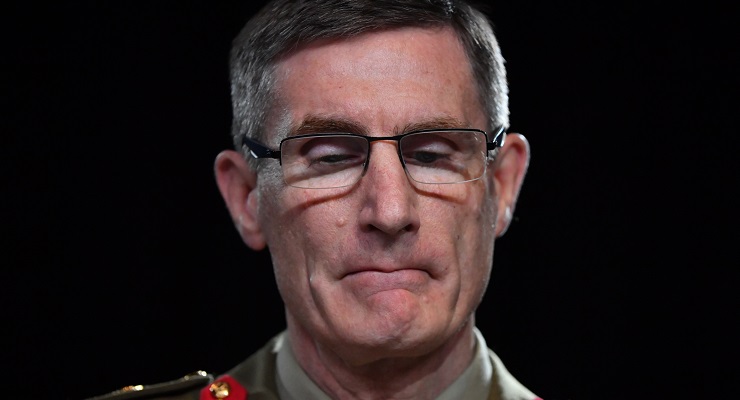
“I know nothing” was the famous catchphrase of Sergeant Schultz in Hogan’s Heroes, used to cover up what he knew, or certainly should have known.
After the release of the Brereton report, you’d be forgiven for thinking it’s the favourite phrase of the officers in command of the special forces in Afghanistan.
It’s unfathomable that the officers in charge had no knowledge of any wrongdoing — and if they really didn’t, that’s just as bad. There was a clear pattern of problematic behaviour that should have raised red flags and needed to be investigated.
The first is that there were rumours of war crimes. Eventually this did lead to the investigation, but why did it take so long?
There were the complaints from Afghans themselves about crimes and rough treatment, dismissed at the time. The report also notes that the system of after-action review and reporting was manipulated and falsified. This should have been apparent to a commander who really wanted to look.
Then there was the culture and behaviours. Despite alcohol being banned on base (for obvious reasons), the special forces had their own bar, the Fat Lady’s Arms. This bar was supplied via the military system, despite being outlawed. It was also the location of numerous examples of misconduct and behaviour that should have indicated that something was rotten.
Special forces also got away with behaviors such as poor hygiene and dress standards. This might seem quaint in a warzone, but it speaks to the character of the soldiers and the decline in discipline. They also went outside the official supply chains and sourced their own weapons and ammunition. The report notes that drug use was rampant.
These conduct issues were explained away by the “logic of exceptionalism” — special forces were fighting a hard and dirty war and should be allowed to do what’s needed to cope.
But as standards decline, so does behaviour — this is the culture the report speaks of. The patterns of behaviour that occurred are well known to be risk factors for abuse and misconduct, yet the commanders failed to see it, or chose to look away.
You had all the warning signs, so you either ignored them or missed them. Either makes you culpable.
The report “exonerates” the officers from legal responsibility, but at least reflects that there’s also a moral aspect to command. As Brereton noted, “commanders are both recognised and accountable for what happens ‘on their watch’, regardless of their personal knowledge, contribution or fault”,
How many are actually held to account remains to be seen.
For anyone seeking help, Lifeline is on 13 11 14, Open Arms Veterans & Families Counselling is on 1800 011 046, and the ADF All-hours Support Line is on 1800 628 036.
Dr James Connor is with UNSW at the Australian Defence Force Academy and is an expert on military culture, scandal and abuse.








At the Tokyo War Crimes trials, they hanged a senior officer under “command responsibility” doctrine for crimes like this on the battlefield.He was nowhere near the men committing the offences at the time.
Why exactly should they escape legal responsibility? Would we want the officers to escape legal accountability if the killers were, say, (just off the top of my head) Chinese elite forces of the People’s Liberation Army?
Yair, just asking.
Looks a lot like law ‘by the corporations, for the corporations’, Max.
Perhaps the officers ‘in charge’ might look to enter into a few ‘enforceable undertakings’ negotiations with the ‘regulator’.
Reminds me of a joke a German told me:
What’s the difference between a fishing net and the Nuremberg Trials? A fishing net catches the big fish and lets the small fish swim away!
More than a few of those tried at Tokyo and Nuremberg talked of ‘victor’s justice’. Those convicted were guilty as hell, of course. The point is that those guilty of war crimes on the Allied side were not called to account, even though some of the crimes were easily comparable with some of those prosecuted in those trials.
Bomber Harris. How he got a memorial is beyond comprehension.
Military and corporate leaders (looking at you banks) who claim to know nothing about the malfeasance of their underlings are either incompetent or liars.
Either way the outcome should be the same.
Summary dismissal with a thorough examination to see if they’ve broken any laws.
It goes even further than just the Military Officers in the Command Structure, it goes all the way to the top, to our Politicians, that make the calls of some of these missions.
See David McBride’s recent explanation of ‘The Shepherd Boy’ at the tube facility.
Yep, “weapons of mass destruction” was a lie, bur also led to the deaths of thousands of innocent children and women.
The film “A few good men” addressed an inappropriate military culture and as it happens in movies the leader was punished but the two relatively unsophisticated solders who ensured his demise were found guilty of disobeying his orders. The orders were to behave illegally but the orders themselves were legal. They were punished severely.
The real leader of an independent group sets the way things are done coerces the rest fall in. It takes extreme moral courage ang personal danger to oppose the culture of the group and almost impossible to ignore a legal order. Once you give in to the culture your stuck with personal liability.
Anyone who tried to do something by pushing the problem up the command chain found their only effective option was to be a whistle blower and we all know where that gets you in Australia.
Without any accountability for officers, there will also be no incentive to ensure units will keep obeying the laws of war.